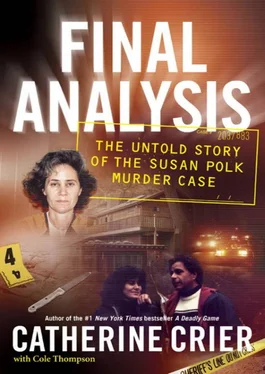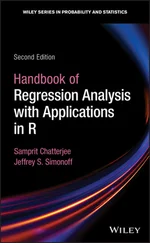It was 9:05 AM when the proceedings got underway. As the prosecution can both open and close the final arguments, jurors heard first from ADA Sequeira that morning. Susan would step before the court that afternoon to deliver her final remarks—after informing Judge Brady she didn’t want her photo taken after the reading of the verdict.
Jurors sat stone-faced as a weepy Susan walked to the podium just after the lunch break. Despite repeated admonishments from the judge, she had objected no less than sixteen times during the prosecutor’s closing remarks that morning.
“Imagine for a second there’s a man on top of you,” Susan began. “What would you do? I kicked him in the groin.”
Susan listed seven reasons why she could not have killed Felix: her arms are not long enough, she’s not big enough to throw Felix to the floor, she had injuries herself, the distribution of the stab wounds, the nature of the head trauma, the physical improbability and a lack of intent to kill.
Compounding her physical inability to murder Felix was the fact that, according to her, a proper investigation never took place. “Anything they found that didn’t fit with murder, they erased.” She contended that police never subpoenaed Felix’s naval records. “I wrote the navy for them and they sent them within two weeks.” In addition, she argued that they didn’t want to locate Felix’s computer “because theoretically it could have shown that Felix was trying to kill me.”
“I made up my husband’s history of violence?” she posed. “Come on.
“According to the D.A., I’m delusional. According to my husband, I was delusional, but I was in charge of our stock portfolio…. This trial has become a witch hunt,” she insisted, anxiously watching the clock in the rear of the courtroom to stay within her time limit. “Am I on trial for saying I predicted the 9/11 terror attacks or am I on trial for murder?”
Susan insisted that even if jurors believed she “is as guilty as a bedbug” they should vote to acquit her because she killed her husband in self-defense.
“Please use your common sense and do not be swayed by the misrepresentations of the district attorney,” she concluded.
And with that, Susan Polk rested her case.
She looked glum as she shuffled back to her seat at the defense table, where a framed photo of a young Eli Polk was propped in front of her. Valerie Harris was seated next to her at the table in a chair traditionally reserved for lawyers. Throughout the proceedings, local attorneys tending to matters in the courthouse had voiced surprise over the court’s decision to allow Harris to sit in that seat. Judge Brady even softened and gave Susan an additional ten minutes to finish her closing remarks that day. But there had been almost nothing traditional about the way Susan’s case had played out over the thirteen weeks. It was on this note that the prosecutor began his last argument to the jury.
“There’s two sets of rules,” Sequeira said during his rebuttal remarks. “There’s one set for Susan Polk and one set for the rest. She lives by her own rules and always has.” He noted that Susan had originally claimed that the sexual relationship with Felix began when she was sixteen. On the stand, she now realized that she was actually fourteen at the time. “The problem is, it’s just like everything else in this case. Sixteen wasn’t good enough. Then fifteen wasn’t good enough. Now it’s fourteen.
“And now she’s being raped and drugged.
“It doesn’t matter, if it was twenty, it’s still wrong.” Sequeira maintained. “But it’s never good enough.”
Walking to the overhead projector, the prosecutor replaced Susan’s childhood photo with a photo of the crime scene. He told jurors, “Susan was not a captive. She was free to leave whenever she wanted. Felix even made arrangements for travel out of the country.”
Reading from Susan’s statements to police during her interview at headquarters that first night, Sequeira strode around the courtroom and replayed her repeated claims of innocence. He also discussed her suicide attempt at Yosemite National Park, her revelations about her marriage at her fortieth birthday party and her theory about Felix’s death.
As he spoke, Susan could not quell the urge to jump up and object to his remarks, but the judge threatened her with sanctions if her protests continued. Once she settled back in her seat, Sequeira laid out his theory of how the murder unfolded. “She did it by surprise,” he said, charging that Susan had the knife with her when she went to speak with Felix in the guesthouse that night. The prosecutor noted that defense pathologist John Cooper had contended the knife used in the assault would not be the weapon of choice to commit a murder. It was too small.
“Oh really?” Sequeira said, raising his arm in the air with dramatic flourish. Standing beneath the judge’s bench, he rapped three times on the ledge of the desk, pretending he was gripping a large knife as Felix answered the door. “‘Can I come in?’” he said, mimicking Susan. “And she’s standing there with a kitchen knife this long?”
Laughter engulfed the courtroom.
Despite the previous warnings from Judge Brady, Susan continued to object, calling for a mistrial no less than five times during the forty-six-minute rebuttal presentation. Nevertheless, Sequeira was not deterred, and when referring to Susan’s accusation that police had “staged” the crime scene, he asked “How did they do it? Couldn’t they have done a better job?
“Felix had blood on his knees. Why would he have blood on his knees if he fell backward? The car, she moved it. Why? The knife, where did it come from? Did it come from his underwear? Susan took the knife from the house. This is evidence of premeditation. The Maglite, if she did not use it as a weapon, then why did she need to wash it off?
“I can only ask you to do the right thing,” Sequeira concluded. “Justice for Dr. Polk and his children is now in your hands.”
Judgment day for Susan Polk was near.
On Tuesday, June 12, jurors got the case—but not before Judge Brady informed Susan that she had failed to enter many of Felix’s naval records into evidence, meaning that jurors could not consider them in their deliberations. Susan was uncharacteristically subdued. Realizing the error was hers, she barely argued with Brady over the pronouncement. She requested only that the judge greet jurors each morning. She wanted to be sure that they were properly admonished not to read or listen to the news or talk outside the jury room about the case. She also wanted them to have a plastic magnifying device that Valerie Harris had purchased for her at Staples to be able to examine crime scene photos and other evidence carefully.
The judge agreed and then directed jurors to begin deliberations in the jury assembly room on the first floor after lunch.
Chapter Twenty-nine
THE JURY’S VERDICT
Jurors had been deliberating for four days when the announcement came that they had reached a verdict on Friday, June 16.
That morning, Susan, dressed in a black, long-sleeved shirt, sat alone at the defense table awaiting their decision. Her mother and brother were in San Diego and had asked that someone phone if there was an acquittal. Eli, the only son who had supported her at trial, was still in jail serving his sentence for assaulting his girlfriend.
Outside the courtroom, there were four uniformed deputies posted to handle the crush of trial watchers anxious to hear the decision. Prosecutor Paul Sequeira and Contra Costa District Attorney Robert J. Kochly seemed in good spirits as they stood in the hallway. Sequeira entered the courtroom first, with Adam, Gabe, and the Briners in tow. Susan’s two sons were dressed casually in jeans and short-sleeve, collared shirts.
Читать дальше











